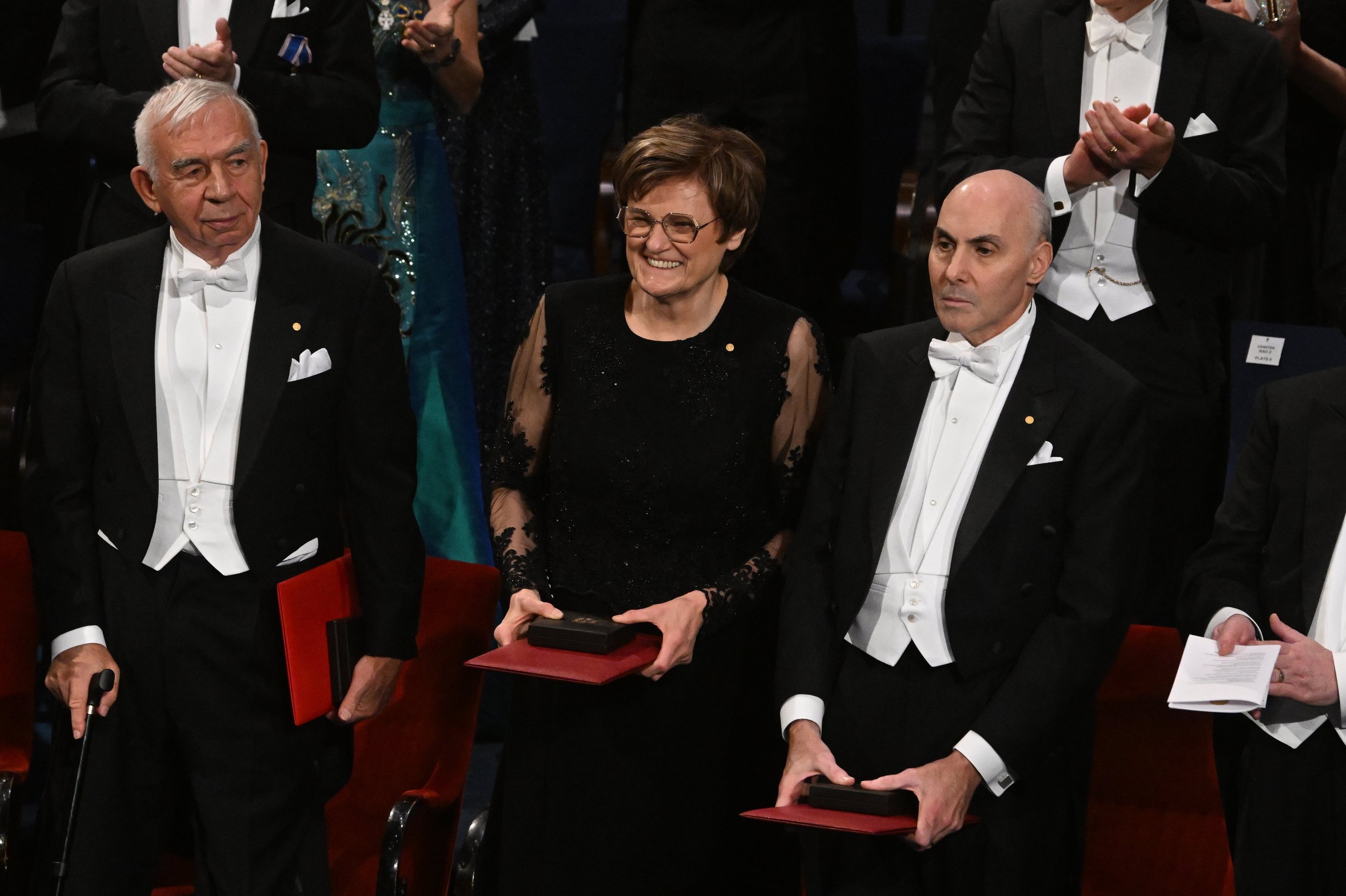Biochemist Katalin Karikó and physicist Ferenc Krausz received the Nobel Prize in Stockholm
Biochemist Katalin Karikó, American microbiologist Drew Weissman (left), and Russian physicist Aleksey Yekimov (right), Nobel laureate in chemistry, after receiving the awards at the 2023 Nobel Prize ceremony in the Stockholm concert hall on December 10, 2023. Photo: MTI / Szilárd Koszticsák
Biochemist Katalin Karikó and physicist Ferenc Krausz received the Nobel Prize in Stockholm on Sunday, December 10, 2023.
King Carl XVI Gustaf of Sweden presented the most prestigious international award in scientific life to the awardees at a ceremony in the concert hall in Stockholm.
On behalf of the Nobel Foundation, Astrid Söderbergh Widding, president of the board of trustees, greeted the awardees. In her speech, she emphasized that Alfred Nobel's message is very clear: he believed that literature, science, and actions carried out for the sake of peace move the world forward. She added: therefore, it is crucial that we respect knowledge and cooperate on an international level.
The president of the board of trustees highlighted that in a period when we see that the mission of academia, culture, and civil society are being challenged, it is very important to keep Nobel's vision in mind. "Fate does not decide the development of the world, we also have the strength and power to influence our destiny and move the world forward," she said.
"We are pushing the boundaries of human knowledge with these researches, which contribute to the development of the world and thus we can prepare for the unpredictable events of the future," emphasized Astrid Söderbergh Widding. "This year's prize winners are very unique, as they have shown us that individually and together we have the potential to change the world," concluded the president of the Nobel Foundation's board of trustees.
Physicist Ferenc Krausz, together with two French scientists, Pierre Agostini and Anne L'Huillier, was awarded the Nobel Prize in Physics for his experimental methods of producing attosecond light pulses for studying the movement of electrons within atoms.
Physicist Ferenc Krausz receives the Nobel Prize in Physics from King Carl XVI Gustaf of Sweden during the 2023 Nobel Prize ceremony at the Stockholm Concert Hall on December 10, 2023. Photo: MTI / Szilárd Koszticsák
"This year's Physics Nobel Prize focuses on tiny details: attophysics and attosecond," said Eva Olsson, professor at Chalmers University of Technology, praising the winners of the Physics Nobel Prize. In her speech, she explained that the universe is huge, but it is controlled by the smallest details, and we cannot always see these with our five senses. These small details affect our lives and give us a huge opportunity to expand our knowledge.
Katalin Karikó, together with her American colleague Drew Weissman, received the Nobel Prize in Physiology or Medicine for their discoveries that laid the foundation for the development of mRNA-based vaccines.
Gunilla Karlsson Hedestam, professor of the Karolinska Institute, praised the laureates and said that although mRNA has been routinely used in various research laboratories for sixty years, it was not well known outside the scientific world until now, when "the Nobel laureates in physiology or medicine secured the mRNA's reputation in the world".
Thanks to the mRNA-based vaccine, it was possible to inform the immune system about the virus and thus our own body can later protect us. She added: Katalin Karikó realized that it is necessary to observe how cells respond to different forms of RNA. The researchers published their most important paper in 2005, which showed that mRNA triggers an immune response in the body, but this can be avoided. This opened a new era and thanks to this method, it was possible to develop a vaccine that could be used to save millions of lives during the Covid epidemic 15 years later, she said. She also emphasized that the production of the vaccine was also speeded up with this method.
Biochemist Katalin Karikó receives the Nobel Prize in Physiology or Medicine from King Carl XVI Gustaf of Sweden at the 2023 Nobel Prize Ceremony in the Stockholm Concert Hall on December 10, 2023. Photo: MTI / Szilárd Koszticsák
At the event, the Nobel Prize in Chemistry was awarded to Moungi Bawendi, Louis Brus, and Aleksey Yekimov for the discovery and production of quantum dots. Norwegian author and playwright Jon Fosse has been awarded the Nobel Prize in Literature "for his innovative plays and prose which give voice to the unsayable." The Nobel Memorial Prize in Economic Sciences was awarded to the American economist Claudia Goldin for decades of research into the position of women in the labor market.
The ceremony was attended by 1,560 invited guests, including family members of the awardees, former awardees, members of the royal family, representatives of awarding institutions, members of the Swedish government and parliament, and representatives of the diplomatic corps.
Before the award ceremony in Stockholm, the Nobel Peace Prize was awarded in Oslo. The award was given to Iranian human rights activist Narges Mohammadi for her fight against the oppression of women in Iran and for human rights and freedom. Instead of the human rights activist imprisoned in her country, her children received the prestigious award and also read her speech. Symbolically, an empty chair marked Mohammadi's place on the stage.
Source: MTI (Hungarian News Agency)


